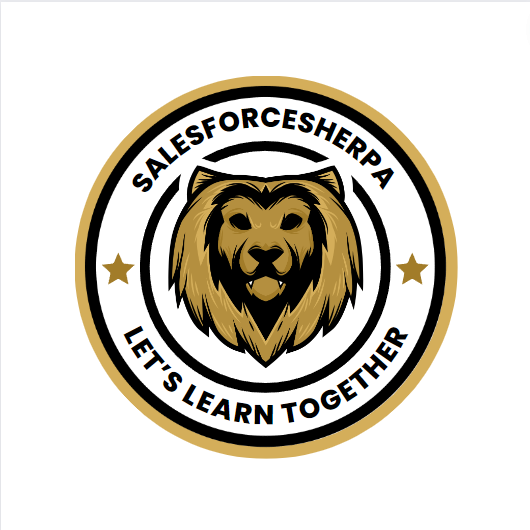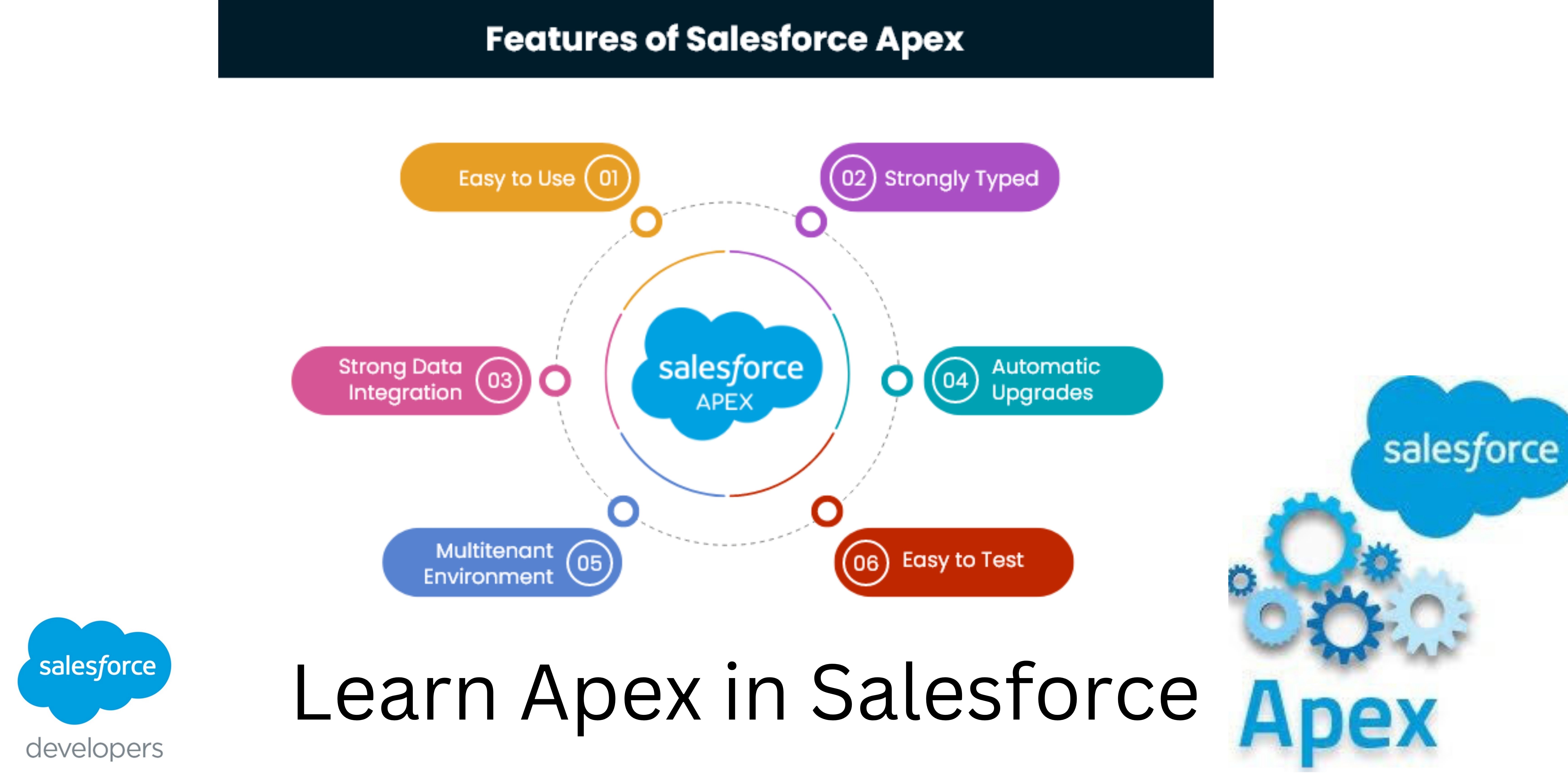Learn Apex in Salesforce: Free Courses and Resources for Beginners
 SalesforceSherpa
SalesforceSherpa
Salesforce is a popular cloud-based customer relationship management (CRM) platform that provides various tools and features to help businesses manage their customer data effectively. One of the key components of Salesforce is Apex, a powerful programming language used to customize and extend the platform's functionalities. If you're looking to learn Apex in Salesforce, this article will guide you through the process and suggest some free courses to get started.
Introduction
What is Apex in Salesforce?
Apex is a strongly-typed, object-oriented programming language developed by Salesforce specifically for the Salesforce platform. It allows developers to write business logic and manipulate data within Salesforce. Apex is executed on the Salesforce servers and can be used to create customizations, automation, and integration with other systems.
Importance of Learning Apex
Learning Apex is crucial if you want to become a proficient Salesforce developer. With Apex, you can extend the capabilities of Salesforce, automate repetitive tasks, and build custom applications tailored to your organization's needs. It enables you to create triggers, workflows, and custom logic to enhance your CRM implementation and provide a seamless user experience.
Getting Started with Apex
What is Apex Programming Language?
Before diving into Apex, it's essential to understand the basics of the language. Apex is similar to Java in terms of syntax and structure, so if you have prior experience with Java or any other C-style language, you'll find Apex familiar. However, even if you're a beginner, Apex is relatively easy to learn with the right resources.
Installing Salesforce Developer Edition
To start coding in Apex, you need a Salesforce Developer Edition account. It's a free version of Salesforce that provides you with a sandbox environment to experiment and learn without affecting your production data. You can sign up for a Developer Edition account on the Salesforce website.
Salesforce Trailhead for Learning Apex
Salesforce Trailhead is a fantastic resource for learning Apex and other Salesforce technologies. It offers interactive and gamified learning modules called "trails" that guide you through various topics. The "Apex Basics" trail is an excellent starting point for beginners, covering the fundamentals of Apex programming.
Basics of Apex
Syntax and Structure
In Apex, each piece of code is enclosed within classes. It follows a syntax similar to Java, with methods, variables, and control structures. Understanding the structure of an Apex class is essential for writing effective code.
Variables and Data Types
Apex supports various data types, including primitives like Integer, Boolean, and String, as well as complex types like Lists and Maps. You'll learn how to declare variables, assign values, and perform operations on different data types.
Operators and Expressions
Apex provides a range of operators for performing arithmetic, logical, and comparison operations. You'll explore how to use these operators to manipulate data and control program flow.
Object-Oriented Programming in Apex
Classes and Objects
Apex is an object-oriented language, allowing you to create classes and objects. You'll learn about class definitions, constructors, instance methods, and static methods. Object-oriented concepts like inheritance, polymorphism, encapsulation, and abstraction are crucial for building modular and maintainable code.
Inheritance and Polymorphism
Inheritance enables you to create new classes based on existing ones, inheriting their properties and methods. Polymorphism allows objects of different classes to be treated as objects of a common base class. Understanding these concepts will help you create reusable and extensible code.
Encapsulation and Abstraction
Encapsulation helps you hide the internal implementation details of a class, exposing only the necessary functionality through public methods. Abstraction allows you to define interfaces and abstract classes to create a blueprint for other classes. Mastering these concepts will make your code more modular and easier to maintain.
Apex Development Environment
Apex Interactive Debugger
Salesforce provides a powerful interactive debugger for Apex, allowing you to set breakpoints, inspect variables, and step through code execution. The debugger is invaluable for troubleshooting and understanding the flow of your Apex code.
Apex Data Loader
Apex Data Loader is a tool that helps you import, export, and delete data in Salesforce. It supports bulk operations and can be used to automate data management tasks. You'll learn how to leverage Data Loader for efficient data manipulation.
Apex Test Framework
Writing unit tests is essential for ensuring the quality and reliability of your Apex code. Salesforce provides an Apex Test Framework that allows you to write test classes and execute test methods. You'll explore the best practices for writing effective tests to validate your Apex code.
Diving Deeper into Apex
Apex Triggers and Triggers Framework
Apex triggers are pieces of code that execute before or after specific events occur in Salesforce, such as record creation, update, or deletion. You'll learn how to write triggers and leverage the triggers framework to automate business processes and enforce data integrity.
Exception Handling
Exception handling is essential for dealing with errors and exceptions that may occur during the execution of your Apex code. You'll understand how to use try-catch blocks and handle different types of exceptions effectively.
Governor Limits and Best Practices
Salesforce enforces certain limits, called governor limits, to ensure the efficient use of shared resources on its servers. You'll learn about these limits and explore best practices to optimize your code and avoid hitting these limits.
Integrating Apex with Salesforce
Apex Web Services
Apex supports the creation of web services that can be consumed by external systems. You'll discover how to create REST and SOAP web services in Apex and integrate Salesforce with other applications.
Apex REST and SOAP
Apex provides built-in classes and methods to handle RESTful and SOAP-based web services. You'll learn how to make HTTP requests, parse responses, and interact with external APIs.
Calling External APIs
Integrating Salesforce with external systems often requires calling APIs. You'll explore techniques to make outbound HTTP requests, handle authentication, and process API responses using Apex.
Free Courses for Learning Apex
Salesforce Trailhead Apex Basics
The "Apex Basics" trail on Salesforce Trailhead covers the fundamental concepts of Apex programming. It includes interactive modules and hands-on challenges to reinforce your learning. The trail is suitable for beginners who want to get started with Apex.
Salesforce Developer Beginner Trail
The "Salesforce Developer Beginner" trail is another excellent resource on Salesforce Trailhead for learning Apex. It provides a comprehensive introduction to Apex, including topics like data manipulation, queries, and Apex triggers. This trail is ideal for individuals with some programming experience who want to dive deeper into Apex development.
Apex Academy by Salesforce Developers
Apex Academy is a dedicated learning platform by Salesforce Developers that offers in-depth courses on Apex programming. It provides a structured curriculum, hands-on projects, and interactive learning materials to help you become proficient in Apex development. Apex Academy is a great option if you want a more comprehensive and immersive learning experience.
In addition to the suggested free courses mentioned, there are several other platforms where you can find valuable resources to learn Apex in Salesforce. Here are some additional free courses available on platforms like YouTube and Udemy:
YouTube Channels:
Salesforce Developers: The official Salesforce Developers YouTube channel provides a wealth of tutorials and educational content related to Apex programming. You can find videos covering various topics, from beginner-level concepts to advanced techniques.
SFDCFacts Academy: SFDCFacts Academy offers a series of free Apex tutorials on YouTube. The channel covers topics such as Apex triggers, batch Apex, and integration with external systems.
Triggers in Salesforce: This YouTube channel focuses specifically on Apex triggers. It provides detailed explanations and examples to help you understand how to write efficient and effective triggers in Apex.
Udemy Courses:
"Apex Academy: Absolute Beginner's Guide to Coding in Salesforce" by David Liu: This Udemy course is designed for absolute beginners who want to learn coding in Salesforce using Apex. It covers the basics of Apex, including syntax, variables, control structures, and object-oriented programming concepts.
"Salesforce Apex Development for Beginners" by Deepika Khanna: This course provides a comprehensive introduction to Apex programming. It covers topics like data types, collections, SOQL queries, and Apex triggers. It also includes hands-on exercises and quizzes to reinforce your learning.
"Salesforce Development: Apex & Visualforce" by Packt Publishing: This course focuses on both Apex and Visualforce, which is a markup language used to create custom user interfaces in Salesforce. It covers Apex fundamentals, database operations, and building custom interfaces using Visualforce.
Salesforce Developer Community:
The Salesforce Developer Community is a valuable resource for developers, offering a wealth of tutorials, documentation, and code samples. You can find step-by-step guides, best practices, and real-world examples shared by the Salesforce developer community.
Remember to explore these resources, watch tutorials, and practice writing code to solidify your understanding of Apex programming in Salesforce. Learning from a variety of sources will provide you with a well-rounded knowledge of Apex and help you become a proficient Salesforce developer.
Conclusion
Learning Apex in Salesforce is a valuable skill that opens up opportunities for customization and automation within the platform. By understanding the basics of Apex, exploring object-oriented programming, leveraging the development environment, and integrating with external systems, you can enhance your Salesforce implementation and build powerful applications tailored to your business needs.
Now, it's time to embark on your Apex learning journey. Start with the suggested free courses and resources mentioned in this article, and remember to practice and experiment with code. Happy learning!
FAQs
Q1. Is Apex similar to Java?
Yes, Apex is similar to Java in terms of syntax and structure. If you have prior experience with Java or any other C-style language, you'll find Apex familiar and easier to learn.
Q2. Can I write Apex code directly in production Salesforce orgs?
It is recommended to develop and test Apex code in a Salesforce Developer Edition or sandbox environment before deploying it to production. This ensures that your code is thoroughly tested and doesn't impact the live data.
Q3. How long does it take to learn Apex?
The time required to learn Apex depends on your prior programming experience and the effort you put into learning. With dedication and consistent practice, you can grasp the basics of Apex within a few weeks.
Q4. Are there any certification exams for Apex in Salesforce?
Yes, Salesforce offers certifications for Apex developers, such as the Salesforce Certified Platform Developer I and Salesforce Certified Platform Developer II. These certifications validate your knowledge and expertise in Apex development.
Q5. Can I build custom applications using Apex in Salesforce?
Absolutely! With Apex, you can build custom applications and extend the functionality of Salesforce to meet your specific business requirements. Apex allows you to create custom objects, implement complex business logic, and integrate with external systems to build robust applications.
Subscribe to my newsletter
Read articles from SalesforceSherpa directly inside your inbox. Subscribe to the newsletter, and don't miss out.
Written by
